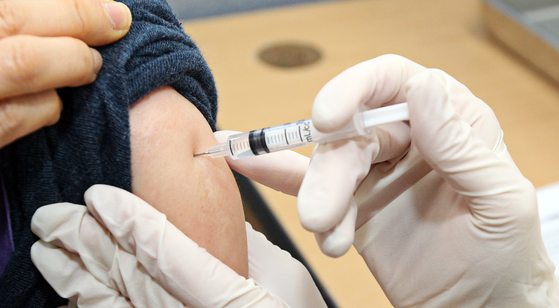
AstraZeneca vaccination. yunhap news
‘0.003%.’
This is the rate of death after vaccination against AstraZeneca novel coronavirus infection (Corona 19) in the UK. The UK started vaccinating AstraZeneca on January 4th (local time). On February 14, more than a month, 6.9 million people received the vaccine, of which 205 (0.003%) died. The death rate after vaccination is similar to that of Korea (0.004%).
Mortality rate after vaccination in Germany is also 0.004%
According to the Korea Centers for Disease Control and Prevention’s report of adverse reactions after vaccination against COVID-19, a case of death was also found in the Pfizer vaccine. In Germany, 105 of the 2432766 nationals who received the Pfizer vaccine were killed. In Germany, the reported death rate after vaccination was 0.004% (as of January 31). No association with death, whether AstraZeneca or Pfizer vaccine, is currently confirmed. This means that vaccination is not a trigger that worsens chronic diseases, but a’situation’ of vaccination.
The Korea Centers for Disease Control and Prevention (KCDC) vaccination damage investigation team held a meeting on the 7th and determined that all of the deaths in Korea were hospitalized patients, and that it is highly likely that they died due to aggravation of the existing illness. Other countries are similar. This is also the reason most countries do not stop vaccinating COVID-19.

Eun-kyung Chung, Director of the Centers for Disease Control and Prevention (Central Defense Countermeasure Headquarters), who was in charge of the COVID-19 vaccination response promotion team. yunhap news
“Death from exacerbation of underlying disease, not vaccine”
In a briefing on the 8th, Kim Jung-gon, head of the vaccination damage investigation team, said, “Most of the patients (dead) had cerebrovascular disease or cardiovascular disease as an underlying disease (terrestrial disease).” “It was judged as death due to worsening of the underlying disease.” He explained.
Kim added, “At the time of death, we also reviewed whether there were symptoms that were suspected to be adverse reactions after vaccination, but there were no special signs.”
Report a series of adverse reactions
Since vaccination began in Korea, reports of adverse reactions have been followed. As of 0 o’clock on the 8th, 3847 (1.23%) of the 3,11583 inoculated subjects complained of muscle pain, headache, fever, and nausea. There were also 33 cases (0.01%) suspected of anaphylaxis. In general, it is distinguished from anaphylaxis, in which symptoms such as shortness of breath or hives appear within 2 hours after vaccination. In addition, 5 patients (0.001%) had severe reactions such as convulsions and admission to the intensive care unit. Vaccine and causality have not been confirmed for severe cases.

Position of major countries using AstraZeneca vaccine. Graphic = Reporter Kim Young-ok [email protected]
In the UK,’facial paralysis’ reported
What about England. The number of reported mild adverse reactions was 31,427 (0.39%), which is lower than that of Korea. The number of suspected cases of anaphylaxis is 0.001%, which is a tenth level. However, in the UK,’facial paralysis’ (aka Guanwasa) was reported in 35 people (0.001%). Fortunately, facial paralysis has not been reported as an adverse reaction in Korea.
“The vaccine currently being vaccinated is a vaccine that has been confirmed to be safe and effective,” said Eun-kyung Chung, head of the Korea Disease Service Agency on the 8th.

On the afternoon of the 8th, medical officials who received vaccination at the National Medical Center’s Corona 19 Vaccination Center in Jung-gu, Seoul are walking. yunhap news
Frequent reporting to anxiety after vaccination
Some argue that the adverse reaction was higher than that of the UK because of anxiety about the first vaccine to be vaccinated against Corona 19 and lack of vaccination technology.
Ma Sang-hyuk, vice-chairman of the Korean Society of Vaccination, said, “The disease administration says, “It is not a’reassurance message’ because of an immune reaction,” he said. “In the general public’s view, if you get a fever at dawn after vaccination, I feel fear. For example, you need to tell them in what situations to use antipyretics or pain relievers. (Disease Administration) seems to be responding passively,” he said.
Vice-Chairman Ma said, “I have to put the vaccine on the deltoid muscle of the shoulder correctly, but this doesn’t work well (in the field).”
Reporter Minwook Kim [email protected]
![]()
